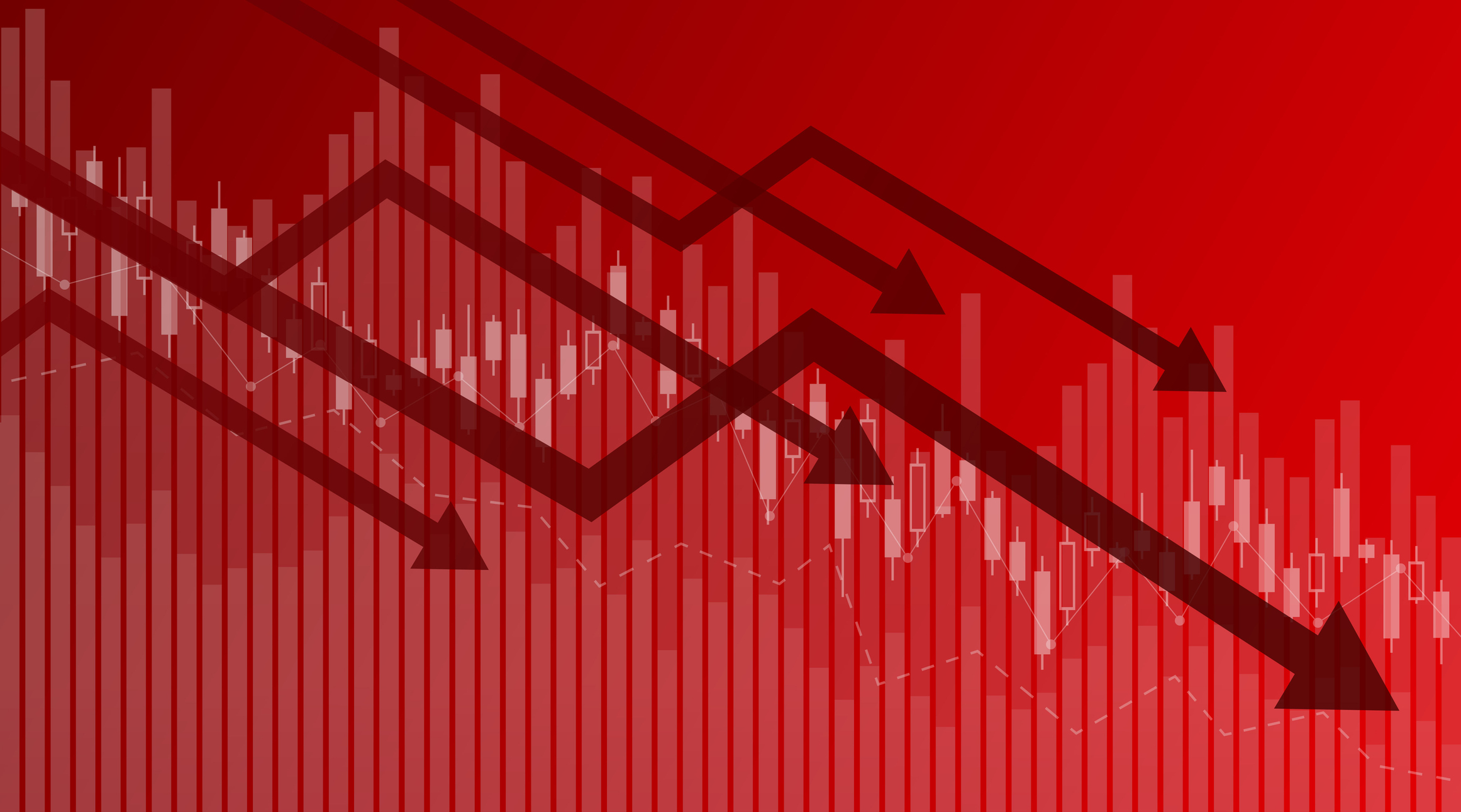Stock Market Today: Big Bank Earnings Fail to Lift Stocks
The major indexes closed lower Friday on hawkish Fed speak and dismal retail sales data.


Profit and prosper with the best of Kiplinger's advice on investing, taxes, retirement, personal finance and much more. Delivered daily. Enter your email in the box and click Sign Me Up.
You are now subscribed
Your newsletter sign-up was successful
Want to add more newsletters?

Delivered daily
Kiplinger Today
Profit and prosper with the best of Kiplinger's advice on investing, taxes, retirement, personal finance and much more delivered daily. Smart money moves start here.

Sent five days a week
Kiplinger A Step Ahead
Get practical help to make better financial decisions in your everyday life, from spending to savings on top deals.

Delivered daily
Kiplinger Closing Bell
Get today's biggest financial and investing headlines delivered to your inbox every day the U.S. stock market is open.

Sent twice a week
Kiplinger Adviser Intel
Financial pros across the country share best practices and fresh tactics to preserve and grow your wealth.

Delivered weekly
Kiplinger Tax Tips
Trim your federal and state tax bills with practical tax-planning and tax-cutting strategies.

Sent twice a week
Kiplinger Retirement Tips
Your twice-a-week guide to planning and enjoying a financially secure and richly rewarding retirement

Sent bimonthly.
Kiplinger Adviser Angle
Insights for advisers, wealth managers and other financial professionals.

Sent twice a week
Kiplinger Investing Weekly
Your twice-a-week roundup of promising stocks, funds, companies and industries you should consider, ones you should avoid, and why.

Sent weekly for six weeks
Kiplinger Invest for Retirement
Your step-by-step six-part series on how to invest for retirement, from devising a successful strategy to exactly which investments to choose.
Stocks started the day modestly higher after several big banks, including JPMorgan Chase (JPM) and Citigroup (C), kicked off first-quarter earnings season on a high note. However, the major indexes quickly turned lower after one Fed official suggested the central bank has more work to do to bring down inflation.
The selling pressure continued throughout the session, though all three main benchmarks managed to hang on to weekly gains.
JPMorgan and Citigroup were among a handful of big banks that reported Q1 earnings this morning. The financial sector, while always important, is even more so right now following last month's failure of several regional banks.
From just $107.88 $24.99 for Kiplinger Personal Finance
Become a smarter, better informed investor. Subscribe from just $107.88 $24.99, plus get up to 4 Special Issues

Sign up for Kiplinger’s Free Newsletters
Profit and prosper with the best of expert advice on investing, taxes, retirement, personal finance and more - straight to your e-mail.
Profit and prosper with the best of expert advice - straight to your e-mail.
But the turmoil didn't seem to impact JPM, which saw first-quarter earnings surge 56% year-over-year to $4.10 per share and revenue jump 25% to a record $38.4 billion. Net interest income – a key metric for banks that measures what they make on loans minus what they pay depositors – was up 49%. Citigroup, for its part, reported steady top- and bottom-line growth for the quarter as higher interest rates fueled an 18% year-over-year jump in personal banking revenue. JPM stock spiked 7.5% today, while C added 4.8%.
"Big banks are largely immune to the issues that drove Silicon Valley Bank and Signature Bank into the columbarium of failed financial institutions," says José Torres, senior economist at Interactive Brokers. "Unlike regional banks [which appear on next week's earnings calendar], the money centers have low costs of funds, especially with the recent failures of smaller banks causing investors to flock to the safety of the biggest financial companies."
Wall Street's positive mood quickly soured after Federal Reserve Governor Christopher Waller said during a speech in San Antonio, Texas, that the central bank must keep raising rates because of stubbornly high inflation and a tight labor market.
Still, signs continue to show that the Fed's efforts to rein in inflation by slowing the economy are indeed working. The Commerce Department earlier said retail sales in March slumped 1% month-over-month, the biggest decline since November, due largely to falling gas prices and auto sales.
Also on the economic front, preliminary data from the University of Michigan showed that while consumer sentiment is up from March (to 63.5 from 62.0), near-term inflation expectations are also on the rise (to 4.6% from 3.6% last month). Longer term inflation expectations remain steady, though.
At the close, the Nasdaq Composite was down 0.4% at 12,123, the S&P 500 was off 0.2% at 4,137, and the Dow Jones Industrial Average was 0.4% lower at 33,886.
Earnings, Tax Day on deck
With the Fed meeting still a couple weeks out and a relatively light economic calendar on tap, all eyes will be on corporate earnings next week. But there's another important event investors should be aware of: Tax Day. While the official deadline to file taxes is Tuesday, April 18, some folks, including taxpayers impacted by severe storms, have extra time. If you need a tax extension, make sure to check out Kiplinger's guidance on how to get more time to file your federal tax return.
Investors will also want to review this year's capital gains tax rates, which apply to profits made from the sale of stocks, mutual funds and other assets. If you're looking for ways to reduce investment taxes, these five strategies could help.
Profit and prosper with the best of Kiplinger's advice on investing, taxes, retirement, personal finance and much more. Delivered daily. Enter your email in the box and click Sign Me Up.

With over a decade of experience writing about the stock market, Karee Venema is the senior investing editor at Kiplinger.com. She joined the publication in April 2021 after 10 years of working as an investing writer and columnist at a local investment research firm. In her previous role, Karee focused primarily on options trading, as well as technical, fundamental and sentiment analysis.
-
 Quiz: Do You Know How to Avoid the "Medigap Trap?"
Quiz: Do You Know How to Avoid the "Medigap Trap?"Quiz Test your basic knowledge of the "Medigap Trap" in our quick quiz.
-
 5 Top Tax-Efficient Mutual Funds for Smarter Investing
5 Top Tax-Efficient Mutual Funds for Smarter InvestingMutual funds are many things, but "tax-friendly" usually isn't one of them. These are the exceptions.
-
 AI Sparks Existential Crisis for Software Stocks
AI Sparks Existential Crisis for Software StocksThe Kiplinger Letter Fears that SaaS subscription software could be rendered obsolete by artificial intelligence make investors jittery.
-
 I'm a 55-Year-Old Dad. Here’s How My 28-Year-Old Daughter Showed Me That AXP Is Still a Solid Investment
I'm a 55-Year-Old Dad. Here’s How My 28-Year-Old Daughter Showed Me That AXP Is Still a Solid InvestmentAmerican Express stock is still a solid investment because management understands the value of its brand and is building a wide moat around it.
-
 If You'd Put $1,000 Into AMD Stock 20 Years Ago, Here's What You'd Have Today
If You'd Put $1,000 Into AMD Stock 20 Years Ago, Here's What You'd Have TodayAdvanced Micro Devices stock is soaring thanks to AI, but as a buy-and-hold bet, it's been a market laggard.
-
 Nasdaq Leads Ahead of Big Tech Earnings: Stock Market Today
Nasdaq Leads Ahead of Big Tech Earnings: Stock Market TodayPresident Donald Trump is making markets move based on personal and political as well as financial and economic priorities.
-
 If You'd Put $1,000 Into UPS Stock 20 Years Ago, Here's What You'd Have Today
If You'd Put $1,000 Into UPS Stock 20 Years Ago, Here's What You'd Have TodayUnited Parcel Service stock has been a massive long-term laggard.
-
 How the Stock Market Performed in the First Year of Trump's Second Term
How the Stock Market Performed in the First Year of Trump's Second TermSix months after President Donald Trump's inauguration, take a look at how the stock market has performed.
-
 Stocks See First Back-to-Back Losses of 2026: Stock Market Today
Stocks See First Back-to-Back Losses of 2026: Stock Market TodayRising geopolitical worries and a continued sell off in financial stocks kept pressure on the main indexes on Wednesday.
-
 Visa Stamps the Dow's 398-Point Slide: Stock Market Today
Visa Stamps the Dow's 398-Point Slide: Stock Market TodayIt's as clear as ever that President Donald Trump and his administration can't (or won't) keep their hands off financial markets.
-
 Stocks Climb Wall of Worry to Hit New Highs: Stock Market Today
Stocks Climb Wall of Worry to Hit New Highs: Stock Market TodayThe Trump administration's threats to Fed independence and bank profitability did little to stop the bulls on Monday.